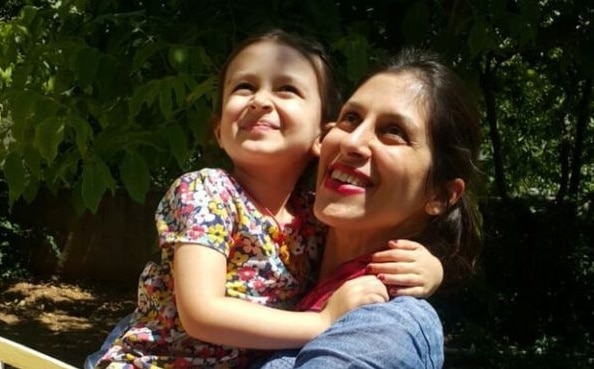Nazanin Zaghari-Ratcliffe and her daughter Gabriella (File)
Iran’s regime has slapped down Foreign Minister Mohammad Javad Zarif’s suggestion of a “swap” for the release of Anglo-Iranian political prisoner Nazanin Zaghari-Ratcliffe from a three-year detention in Tehran.
Speaking at the Asia Society in New York on Wednesday, Zarif said he had the authority to arrange the swap, claiming it was offered in private six months ago to the US. He said Zaghari-Ratcliffe could be exchanged for “an Iranian lady in Australia”, Negar Ghodskani, “who gave birth to a child in prison”.
Iran Daily, April 25: Foreign Minister Offers Swap for Political Prisoner Zaghari-Ratcliffe
The US is seeking the extradition of Ghodskani on charges, carrying up to 20 years in prison, that she obtained and smuggled sensitive technology from the US to Iran. She has been detained in South Australia since June 2017.
But on Thursday, Foreign Minister spokesman Abbas Mousavi retreated, “What the Iranian Foreign Minister raised in New York just concerns Iranian prisoners in the US or those arrested in other countries at Washington’s request with a number of American criminals in Iran.”
Zarif made no further statement. Instead, Iranian State outlet Press TV deleted his reference to Zaghari-Ratcliffe, a charity worker for Thomson Reuters Foundation, and rewrote his comments as “Tehran’s preparedness for a prisoner swap with the US”.
It is unclear which part of the regime pulled back Zarif, but up to Wednesday the Foreign Minister said Zaghari-Ratcliffe’s detention was a matter for the Iranian judiciary.
UK Rejection
Earlier Thursday, UK Foreign Secretary Jeremy Hunt rejected the swap as “vile”, citing a “huge difference” between Zaghari-Ratcliffe’s detention and that of Ghodskani:
The woman in jail in Australia is facing due process, a proper legal procedure, and she is alleged to have committed a very serious crime.
Nazanin Zaghari-Ratcliffe is innocent — she has done nothing wrong. What is unacceptable about what Iran is doing is that they are putting innocent people in prison and using it as leverage.
Zaghari-Ratcliffe was seized in April 2016 as she and her infant daughter were leaving Tehran after visiting relatives. She was sentenced to five years for espionage.
No substantial evidence was ever publicly presented in the case, but subsequent State TV “documentaries” tied the prosecution to Zaghari-Ratcliffe’s employment BBC Media Action in 2009-2010.
The BBC program trains journalists overseas. The Iranian regime, which has long pressed BBC Persian by harassing and threatening its staff and their relatives, converted Zaghari-Ratcliffe’s administrative post into one of developing reporters to seek the overthrow of the Islamic Republic — amid mass protests over the disputed 2009 Presidential election.
Before the retraction of Zarif’s statement, Zaghari-Ratcliffe’s husband Richard Ratcliffe was cautious.
It’s clearly a hopeful thing that [Zarif] was talking about her release explicitly.
At the same time, linking her in a public way to a big complicated deal that is almost impossible to do because it’s been made public could easily be a displacement tactic.

